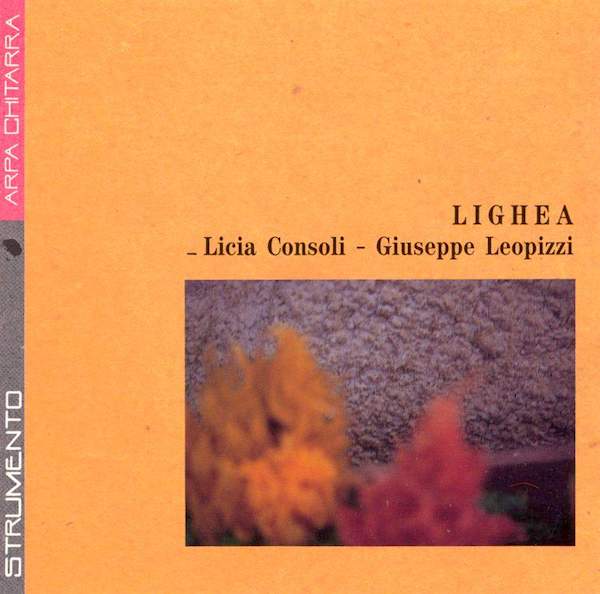
If you’ve followed this blog for a while now, you’ve probably realized that I make no bones about my love for and promotion of folk music. And, usually, around this time of the year you actually get a bigger peek into this, one of my earliest musical loves, via various albums or mixes I share here. It’s my way of matching the season with music. Through them, I think, I show how malleable and inspirational and or forward-thinking “tradition” can still be for any current generation. So, rather than completely put all our ends in one “experimental/blinder’s on/electronic” basket, it’s never either/or, we can see the special in the immediacy of such similar music. Case in point: today’s nearly hour-long sublime “Italian” reimagining of these Anglophilic ideas by Sicilian harpist Licia Consoli and her husband the late, great guitarist Giuseppe Leopizzi on 1993’s Lighea.
If you look at the album cover, somewhere beyond its gorgeous, hazy, autumnal hues and portrait, right around its border you have all the clues needed to pinpoint to what’s inside. Strumento, arpa, chitarra, Lighea. Instrument. Harp. Guitar. Lighea.

Strumento was the little-heralded home of Italian instrumentalists dedicated to a creation of “new music”, not quite New Age or jazz (more in between), a real exploration of the sonorities of certain instruments. It was in this small off-shoot of the larger, hit-producing, DDD record label that big, Italian fusion guitarist Riccardo Zappa signed an interesting mixture of Italian folk, ambient, and neoclassical artists. Here, most of the time under his production, Riccardo would have them fully explore (without label pressure) a specific instrument, creating a large palette/vista of their own choosing using that particular tool.
In the early days, Palermo musician’s Giuseppe Leopizzi and Licia Consoli came to connect through the neotraditional group, Aes Dana. Working in the shadows of the more trafficked Italian folk tradition, it was within that group that they explored far older connections between their Mediterranean music tradition and its sprawling roots that touched the coasts of Normandy, North Africa, Ireland, Scotland and England. Created in 1982, by the mid ‘80s, Aes Dana had done the unthinkable and had created/recorded music that saw them performing with the likes of Robin Williamson and in/around Ireland itself. So astounding were their own compositions for the album The Far Coasts Of Sicily that it rekindled Robin’s own attempts to write music for the Celtic harp and acoustic guitar.
In the late ‘80s Riccardo Zappa convinced the now wedded duo to reexamine and reimagine those roots. Credited as a duo of guitar and harp, they signed to Strumento, and went to distill various concepts into songs that moved further away from all of their roots. Seemingly, feeling their way out through whatever was capable of their chosen instrument, a record Nierika was released in 1990, their first proving that such a thing was possible from their neck of the globe.
1993’s Lighea was the perfection of that sojourn through other lands. Far more pastoral and less cerebral, now in full flight, every crystalline plucked harp string landed (or better yet, danced) on/around Giuseppe’s acoustic strings like the sun refracting through fallen leaves. Each color on standout tracks like “Respiro D’erba”, “Farewell to Doolin”, and “Ramo Di Corallo”, seemingly branching out from the same tree but hitting at a different hue from the same spectrum.
There are signs of the yearning, sustained melodies of continental Europe. Then as quickly as you assume something, those dissolve into whatever other reaches either a DADGAD or some other modal D tuning can attain. Percussion rhythms, either played by Riccardo Zappa or Federico Sanesi, on tunes like “Arcipelago” and “Samira Ama Jamila” recall the transient neofolk of Clive Palmer (who must have been one of the many whom influence is felt here).

Completely instrumental and deeply autumnal in tone/mood, Lighea much like the titular character it drew inspiration from, that from Sicily’s other master Giuseppe Tomasi di Lampedusa’s melancholic meditation on poetry, The Professor and the Siren, this album signalled another subtle sea change to our understanding of how the eternal always has a way of finding its soft landing. Pluck a few strings, strum a few notes — all expertly chosen — and no matter who you are, or where you are, the canvas has found its portrait, it’s somewhere in between ye ole cortex of ours. A renaissance of the harp and guitar.
